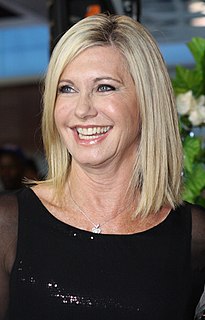
Dame Olivia Newton-John was a British-Australian singer, actress and activist. She was a four-time Grammy Award winner whose music career included five number-one hits and many other Top Ten hits on the Billboard Hot 100, and two number-one albums on the Billboard 200: If You Love Me, Let Me Know (1974) and Have You Never Been Mellow (1975). Eleven of her singles and 14 of her albums have been certified Gold by the Recording Industry Association of America (RIAA). With global sales of more than 100 million records, Newton-John is one of the best-selling music artists from the second half of the 20th century to the present.
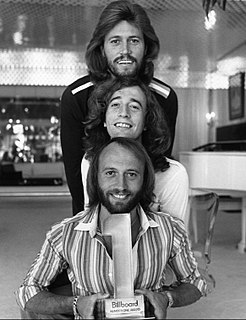
The Bee Gees were a music group formed in 1958, featuring brothers Barry, Robin and Maurice Gibb. The trio were especially successful as a popular music act in the late 1960s and early 1970s, and later as prominent performers of the disco music era in the mid- to late 1970s. The group sang recognisable three-part tight harmonies; Robin's clear vibrato lead vocals were a hallmark of their earlier hits, while Barry's R&B falsetto became their signature sound during the mid- to late 1970s and 1980s. The Bee Gees wrote all of their own hits, as well as writing and producing several major hits for other artists and have been regarded as one of the most important and influential acts in pop music history. They have been referred to in the media as The Disco Kings, Britain's First Family of Harmony, and The Kings of Dance Music.
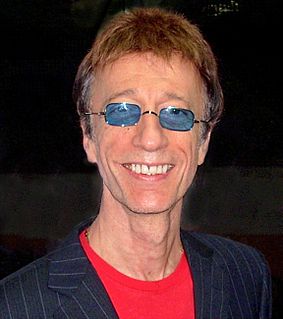
Robin Hugh Gibb was a British singer and songwriter who gained worldwide fame as a member of the Bee Gees pop group with elder brother Barry and fraternal twin brother Maurice. Robin Gibb also had his own successful solo career. Their youngest brother Andy was also a singer.

Sir Barry Alan Crompton Gibb is a British musician, singer-songwriter, and record producer who rose to worldwide fame as a member of the Bee Gees, one of the most commercially successful groups in the history of popular music. With his younger brothers, fraternal twins Robin and Maurice Gibb, he formed a songwriting partnership beginning in 1955. He has lived in Britain, Australia, and the United States, holding dual UK–US citizenship, the latter since 2009.
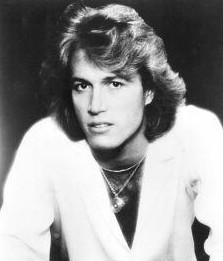
Andrew Roy Gibb was an English-Australian singer, songwriter, and actor. He was the younger brother of the Bee Gees: Barry, Robin, and Maurice Gibb.

One Night Only is a live album and DVD/Blu-ray by the Bee Gees. It features the group's concert at the MGM Grand in Las Vegas in 1997 and includes many of their greatest hits.
A charity record or charity single is a song released by musicians with most or all proceeds raised going to a dedicated foundation or charity.
Vincent Melouney (Maloney) is an Australian guitarist, vocalist, and songwriter best known as an official member of The Bee Gees from 1967 to 1969 during the group’s initial period of worldwide success.
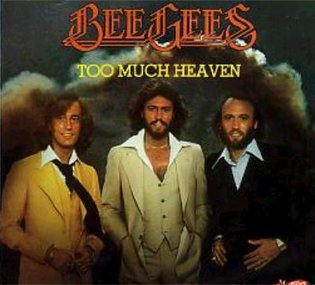
"Too Much Heaven" is a song by the Bee Gees, which was the band's contribution to the "Music for UNICEF" fund. They performed it at the Music for UNICEF Concert on 9 January 1979. The song later found its way to the group's thirteenth original album, Spirits Having Flown. It hit No. 1 in both the United States and Canada. In the United States, the song was the first single out of three from the album to interrupt a song's stay at #1. "Too Much Heaven" knocked "Le Freak" off the top spot for two weeks before "Le Freak" returned to #1 again. "Too Much Heaven" also rose to the top three in the United Kingdom. In the US, it would become the fourth of six consecutive No. 1s, equalling the record set by Bing Crosby, Elvis Presley, and the Beatles for the most consecutive No. 1 songs. The six Bee Gee songs are "How Deep Is Your Love", "Stayin' Alive", "Night Fever", "Too Much Heaven", "Tragedy" and "Love You Inside Out". The songs spanned the years of 1977, 1978 and 1979.

"Chiquitita" is a song recorded by Swedish pop group ABBA. It was released in January 1979 as the first single from the group's sixth album, Voulez-Vous (1979). Agnetha Fältskog performs the lead vocals. Originally, the track "If It Wasn't for the Nights" was going to be the album's lead single, but after "Chiquitita" was completed those plans were abandoned, and it would remain an album track.

The Midnight Special is an American late-night musical variety series originally broadcast on NBC during the 1970s and early 1980s, created and produced by Burt Sugarman. It premiered as a special on August 19, 1972, then began its run as a regular series on February 2, 1973; its last episode was on May 1, 1981. The 90-minute program followed the Friday night edition of The Tonight Show Starring Johnny Carson.

A benefit concert or charity concert is a type of musical benefit performance featuring musicians, comedians, or other performers that is held for a charitable purpose, often directed at a specific and immediate humanitarian crisis.
Humpy Bong was an English folk rock band formed in London in 1970, by former Bee Gees drummer Colin Petersen and Irish folk rock singer Jonathan Kelly.

Albhy Galuten is an American technology executive and futurist, Grammy Award-winning record producer, composer, musician, orchestrator and conductor. He has numerous inventions and has produced 18 number 1 singles with songs and albums selling over 100,000,000 copies. He has won two Grammy Awards, a Dramalogue award, and a BMI award.

After Dark is the third and final studio album by English singer-songwriter Andy Gibb. It features his last US Top 10 single "Desire", "I Can't Help It" and two Bee Gees numbers "Rest Your Love on Me" and "Warm Ride".

Spirits Having Flown Tour is the eighth concert tour by the Bee Gees in support of their fifteenth studio album Spirits Having Flown (1979). The tour began on 28 June 1979 in Fort Worth, Texas reaching a total of 38 cities before coming to a close on 6 October 1979 in Miami, Florida. It was their most lavish and successful tour during the height of their popularity following two straight number-one albums and six number-one singles and grossed over $10 million from 49 shows, as reported by Billboard by the end of its run. The tour was organized and promoted by Jerry Weintraub and Concerts West.
"Rest Your Love on Me" is a country ballad performed by the Bee Gees written and sung by Barry Gibb. It was the B-side of the US No. 1 hit "Too Much Heaven". Andy Gibb recorded the song as a duet with Olivia Newton-John for his 1980 album After Dark.

ABBA: The Tour, later also labelled ABBA in Concert and ABBA: North American and European Tour 1979, was the third concert tour by the Swedish pop group, ABBA. Primarily visiting North America, Europe and Asia during 1979–1980, the tour supported the group's sixth studio album, Voulez-Vous. The tour opened in Edmonton, Alberta, Canada, on September 13, 1979, and the tour closed in Tokyo, Japan on March 27, 1980, having performed 52 shows in 40 cities across 13 countries. As it was the group's final tour before unofficially disbanding in late 1982, it included the largest catalogue of hit songs performed on a tour.













